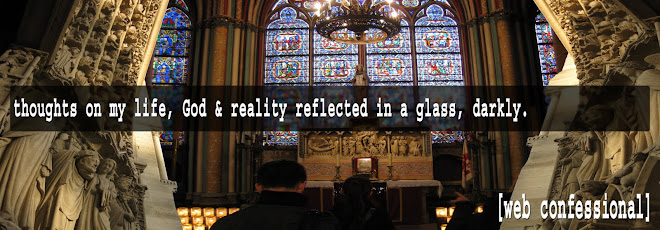today i have to turn in a paper for my final biblical perspectives class, once again, discussing my thoughts and feelings on the bible. my real final paper isn't due till next week. i may or may not post that one. the idea with this one though is to see if the class has changed my thoughts and feelings.... this class unfortunatley was kind of a disappointment. but anyways, here's my second paper, which really doesn't reflect much from my class experience, but is fine because the only requirement is that the paper begin with "the bible is..."
The Bible is ultimately God’s story. It tells how God created everything, and chose humans to be his partners, as his image bearers, in taking care of his creation. It describes how humans abandoned their dependency on God and the fallout from that decision. From there the Bible tells about how God chose a specific people to be his vehicle in restoring his creation; how he chose them to live in relationship with him; and how they continually betrayed that relationship. The story climaxes with Jesus and his role as Israel’s, and eventually, the world’s redeemer. It describes the life of the early communities of Jesus’ followers; and ends with an apocalyptic vision of a new creation where God and humans dwell together at last. But this narrative of creation, fall and redemption that ends in the marriage of God and humanity can be a hard and bitter pill to swallow.
The Bible is an incredibly messy, disheveled, yet beautiful story. In its description of human behavior, it is gut-wrenchingly real. The story of David’s affair with Bathsheba describes a man who is supposed to be of the highest moral caliber, yet sleeps with the wife of someone who was probably a close friend. After attempting to cover up the product of the affair, David sets the husband up to be killed in battle. Thus the Bible’s portrayal of humans is that they are creatures of contradiction, but sometimes the most seemingly conflicted person in the Bible is its central character-- God.
Its stories of mass human slaughter at the hands of God’s people are unbearably disturbing, and seem impossible to reconcile that they are orders from a God who is later revealed to be love itself. Yet in these stories, sometimes referred to as “texts of terror,” there are glimpses of God’s mercy such as when Rahab is spared in the battle of Jericho. It is this mixture of brutality, barbarism, love and compassion that can make the Bible difficult to be taken as “God’s word.” Indeed it seems ludicrous to believe that Jesus, when he teaches to love one’s enemies, is the incarnation of YHWH, warrior God of the Old Testament.
And therein lays the mystery and paradox, which is often for me, more difficult to swallow than the resurrection or the crossing of the Red Sea: a monstrous God of love? So my thoughts and feelings concerning the Bible are in a constant state of flux and evolution. On one hand, its jarring portrayal of God smacks of mere human invention. Our intuition tells us that the one true God should be blatantly clear and unambiguous. On the other, its incongruent picture of God is consistent with the confusing nature of the rest of reality. I maintain that it is inspired by the God who is manifested in the person of Jesus Christ. I believe its story of creation, fall and redemption is the true story underlying all of history, and at the center of all existence. But I don’t ignore that those propositions take an incredible amount of faith.
Subscribe to:
Post Comments (Atom)

No comments:
Post a Comment